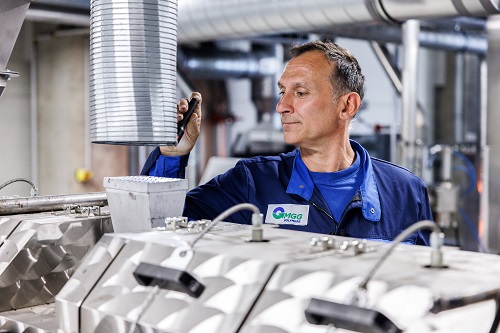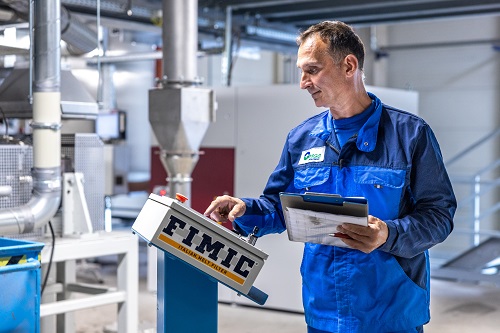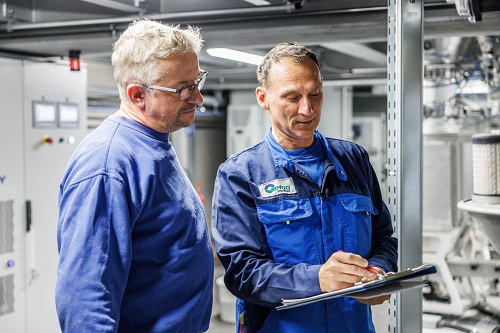Manfred Bierbaumer has been working for MGG Polymers for almost 20 years and knows the company inside out. He started out in the traditional way, working on one of the machines. He is now a shift supervisor and therefore responsible for the team and the equipment.
Mr Bierbaumer, you started working at MGG Polymers in 2006. What was it like back then, when the plant was still in its infancy, so to speak?

One of Manfred Bierbaumer’s tasks is to monitor the equipment. A breakdown can have serious consequences for production.
Manfred Bierbaumer: It was an exciting and inspiring time. When I started here, Kematen an der Ybbs was still in its infancy. Of course, there were already plants in operation, but there was still a lot missing. Research was conducted, trials were carried out, ideas were rejected and we started all over again. Processes were further developed, plants and machines were optimised or newly purchased. Over the years, MGG Polymers has developed into what it is today: an innovative, modern company with its sights set firmly on the future.
That sounds like an exciting professional environment you work in.
That’s right. I don’t want to dwell too much on the past, but when you consider that when I started out, we processed 25 tonnes of WEEE material per day, and today we’re at around 150 tonnes, it’s impressive to see what has happened over the past two decades. Not only having witnessed this development, but also having helped shape it, makes me proud and has greatly strengthened my loyalty to the company.
How did you join the company?

When Manfred Bierbaumer is on the early shift, he is also responsible for keeping records of the last 24 hours. Records are kept on raw materials, extrusions, downtime, consumption of water or by-products, and much more.
I am a trained metalworker and was working for a company that was involved in metalwork for the construction of the Polymers plant. That’s how I first came here and found everything very exciting. There was a spirit of optimism in the air, and everyone was highly motivated. It seemed like something completely new was emerging. I was fascinated by this and began to consider changing jobs. Shift work instead of long hours on assembly was also a factor for me. In short: they were looking for staff, I applied and was ultimately hired.
Was your training the deciding factor?
When I first started, the processes weren’t as well established as they are today, so we often had to intervene or carry out repairs during operation. It was therefore advantageous to have an electrician or locksmith on every shift. This meant that many issues could be resolved immediately without any significant loss of time.
Today you are a shift supervisor. How did you get started?
I started in the so-called ‘wet area’, which is the first station where the raw material arrives in the hall. Over the years, I worked my way forward – following the material flow, so to speak – and learned to operate each and every machine. The processes were further optimised with the aim of extracting more and more usable plastics from the raw material delivered. Like my colleagues, I had to develop my skills and keep up. I took on the position of shift supervisor eight years ago, having previously been deputy shift supervisor for ten years.
What exactly is your job as shift supervisor?
During my shift, I am responsible for my team of 14 people and for ensuring that the systems run smoothly. I draw up the duty rosters – and change them if colleagues are absent due to illness or holiday. If a machine is not running properly, quick action is also required. Sometimes I even fill in for a colleague or repair a fault in the plant. In such situations, it helps that I have worked in all areas of the plant. Training new employees is also part of my job.
Can you describe a typical working day as a shift supervisor?

Communication with colleagues is essential for smooth operations. Only when Manfred Bierbaumer is informed about all relevant events can he make the right decisions.
The great thing about my job is that no two days are the same. But of course there are routines that repeat themselves. Take the early shift, for example, which starts at 4:50 a.m. with the handover. I discuss with my colleague from the night shift what has been going on during the last few hours. Were there any disruptions, how did production go, which orders were processed and which are next in line? Then I do a tour of the plant, check the machines and discuss the work and orders with my colleagues. As the morning shift supervisor, I am also responsible for keeping records of the last 24 hours. We keep records of raw materials, extrusions, downtime, water consumption, by-products and much more. My colleagues‘ holidays and sick leave are also recorded in these logs. At 8 a.m., I have a morning meeting with my colleagues from production management, quality management, logistics, the laboratory, maintenance, process engineering and management. We discuss which orders are due by the next day and whether there are any current problems with the machines. Upcoming personnel issues are also often a topic of discussion.
After that, I start what is known as day-to-day business. My colleagues on the shift basically work independently to complete the orders that are pending. However, as there are always last-minute changes, we are in constant communication with each other. We also have frequent contact with the laboratory, as the machines have to be continuously adjusted to the raw material being processed. Appropriate checks ensure that the agreed quality of the delivery is maintained and also determine which contaminants need to be filtered out of the material. We adjust the machines to these contaminants so that the further processing process runs smoothly. At 12:50 p.m., we hand over to the next shift.
What makes working at MGG Polymers so special for you?
In order to stay ahead in the plastics recycling industry, continuous development and optimisation are essential. This is not limited to processes and equipment. We as people are also challenged to keep moving forward, to develop and to progress. That’s what makes my job so fascinating. When I drive to work, I never know what to expect. Every day is different, every day is a challenge. And I’m happy to take them on.
What makes MGG stand out as an employer?
The Müller-Guttenbrunn Group offers its workforce security, stability and future prospects. And I think it’s great to work for a family-run company. At joint in-house activities – I’m a big fan of the karting trophy – there are always opportunities to chat with the boss, Christian Müller-Guttenbrunn, in person. But even outside of celebrations, the appreciation you receive is immense.
Finally, let’s get to know Manfred Bierbaumer a little better on a personal level.
I’d be delighted! I am 51 years old, married and the father of two daughters (aged 10 and 13) and a son (aged 15). I live with my family in Stephanshart. In my spare time, I breed rabbits, am active in the small animal breeders‘ association, am commander of the Austrian Comradeship Association and am a passionate fisherman. Of course, I also make sure to spend plenty of time with my wife and children. Together, we explore our local area by bike or go stand-up paddleboarding on the Danube. In summer, we like to travel south to the sea. These family holidays allow me to pursue another passion of mine: sightseeing. As you can see, even outside of work, standing still is not my thing!
During the interview, Manfred Bierbaumer has already glanced at his mobile phone a few times, which has not (entirely) escaped our notice. But now it’s really urgent – he has to take care of his ‘business’. We are happy to send him back to work and wish him all the best for the future!
